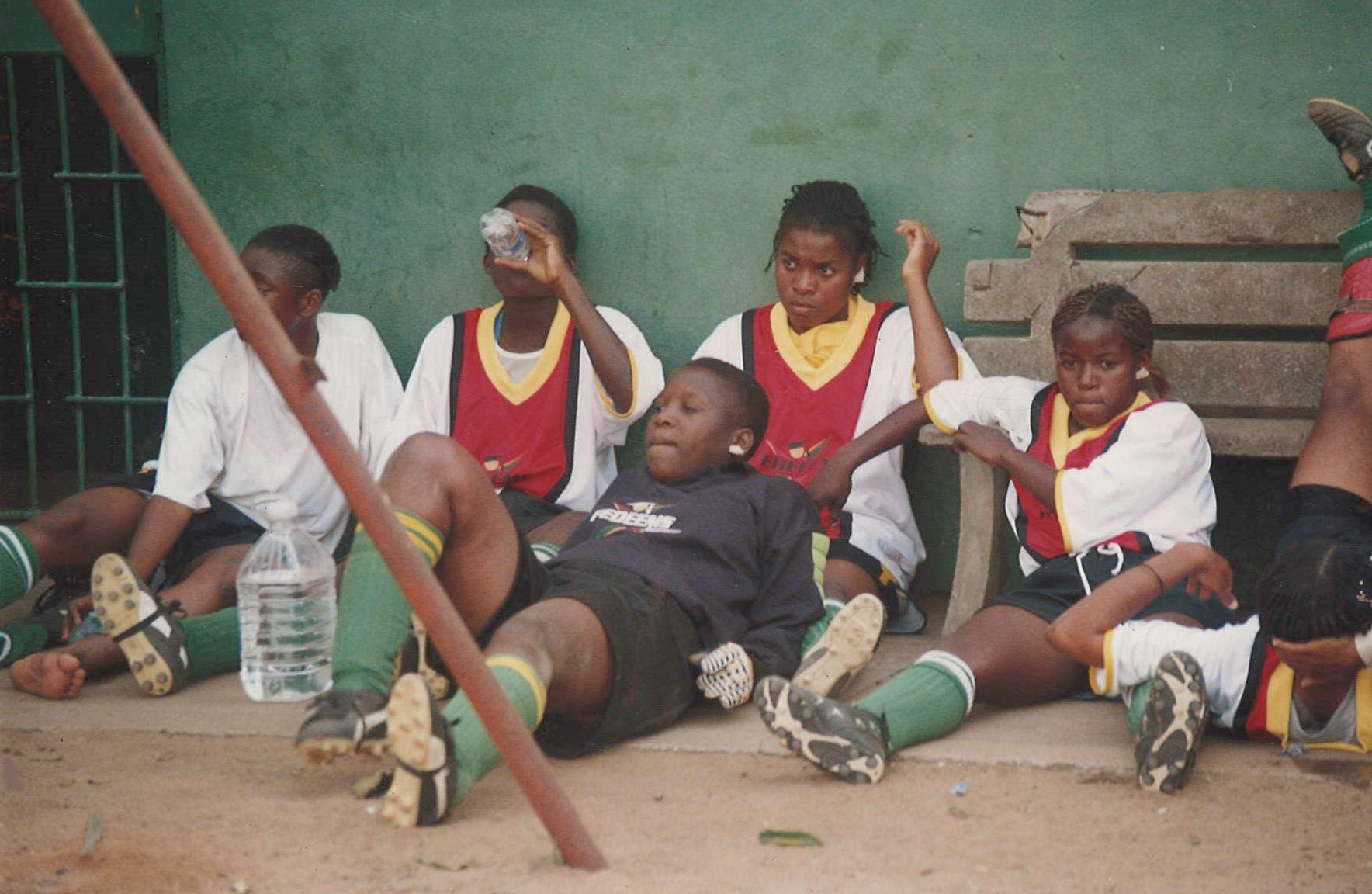Praxis para a transformação social o caso Meninas em Campo
Conteúdo do artigo principal
Resumo
Meninas em Campo é um exemplo pró-ativo de grande sucesso na promoção da igualdade de gênero por meio do discurso e da práxis. Trata-se de uma organização sem fins lucrativos localizada no Butantã, São Paulo, que oferece um espaço para meninas de 9 a 17 anos se desenvolverem como jogadoras de futebol. Financiado pelo Colégio Santa Cruz e apoiado pela Universidade de São Paulo. O Meninas em Campo é o maior projeto de futebol feminino de base social, fora dos grandes clubes. Fornecendo um modelo para o desenvolvimento do futebol feminino. Este artigo sugere que muito mais atenção deve ser dada aos anos formativos cruciais, em que gerações de meninas têm sido marginalizadas dos canais formais.
Downloads
Detalhes do artigo
Seção

Este trabalho está licenciado sob uma licença Creative Commons Attribution 4.0 International License.
Autores que publicam nesta revista concordam com os seguintes termos:
1. Autores mantém os direitos autorais e concedem à revista o direito de primeira publicação, com o trabalho simultaneamente licenciado sob a Licença Creative Commons Attribution que permite o compartilhamento do trabalho com reconhecimento da autoria e publicação inicial nesta revista.
2. Autores têm autorização para assumir contratos adicionais separadamente, para distribuição não-exclusiva da versão do trabalho publicada nesta revista (ex.: publicar em repositório institucional ou como capítulo de livro), com reconhecimento de autoria e publicação inicial nesta revista.
3. Autores têm permissão e são estimulados a publicar e distribuir seu trabalho online (ex.: em repositórios institucionais ou na sua página pessoal) a qualquer ponto antes ou durante o processo editorial, já que isso pode gerar alterações produtivas, bem como aumentar o impacto e a citação do trabalho publicado (veja O Efeito Acesso Livre).
Como Citar
Referências
ALMEIDA, C. S. de. O Estatuto da FIFA e a igualdade de gênero no futebol: histórias e contextos do futebol feminino no Brasil. FuLiA/UFMG, v. 4, n. 1, p. 72-87, 2019.
ANJOS, L. A. DOS et al. Guerreiras Project: futebol e empoderamento de mulheres. Revista Estudos Feministas, v. 26, 15 jan. 2018.
ASSIS, M. P.; OGANDO, A. C. Bolsonaro, ‘gender ideology’ and hegemonic masculinity in Brazil. Al Jazeera, p. 1-4, 2018.
BELAS TRINDADE, J. B. Lyon’s Christiane Endler: ‘Girls must have the same training as boys’. The Guardian, 22 fev. 2023.
BIRAM, M. As Sereias da Vila na terra do rei: uma etnografia de Santos FC Feminino. Movimento, v. 27, 2021.
BIRAM, M. Women’s Club Football in Brazil and Colombia: a critical analysis of players, media and institutions (PhD Thesis). Acesso em: 24 jun. 2022.
BIRAM, M. Obrigatoriedade and the professionalisation of women’s football in Brazil. In: Women’s Football in a Global, Professional Era. Emerald Publishing Limited, 2023, p. 33-47.
BULLINGHAM, R.; MAGRATH, R. ‘Pink hair, don’t care’: a print media analysis of Megan Rapinoe at the 2019 Women’s World Cup. In: Women’s Football in a Global, Professional Era. Emerald Publishing Limited, 2023, p. 221-234.
CASHMAN, H. R.; RAYMOND, C. W. Making gender relevant in Spanish-language sports broadcast discourse. Gender & Language, v. 8, n. 3, 2014.
DAMATTA, R. Carnavais, malandros e heróis: o dilema brasileiro do espaço público. Rio De Janeiro: Zahar, 1979.
ELSEY, B. Fútbol Feminista: energized by the# NiUnaMenos movement, women’s soccer teams take on the patriarchs of the beautiful game in Latin America. NACLA Report on the Americas, v. 50, n. 4, p. 423-429, 2018.
ELSEY, B.; NADEL, J. Futbolera: A history of women and sports in Latin America. Austin: University of Texas Press, 2019.
FONTES, P.; BUARQUE DE HOLLANDA, B. The country of football: politics, popular culture, and the beautiful name in Brazil. London: Hurst, 2014.
FREDERICK, E. L.; PEGORARO, A.; SCHMIDT, S. “I’m not going to the f*** ing White House”: Twitter users react to Donald Trump and Megan Rapinoe. Communication & Sport, v. 10, n. 6, p. 1210-1228, 2022.
FREIRE, P. Pedagogy of the oppressed. London: Penguin, 1971.
GARTON, G. Guerreras: fútbol, mujeres y poder. Buenos Aires: Capital Intelectual, 2019.
GARTON, G.; HIJÓS, N.; ALABARCES, P. Playing for change: (semi-) professionalization, social policy, and power struggles in Argentine women’s football. Soccer & Society, v. 22, n. 6, p. 626-640, 2021.
JORAS, P. S. Futebol e mulheres no Brasil: a história de vida de Aline Pellegrino. UFRGS, 2015.
JORAS, P. S.; GOELLNER, S. V. Depoimento de Aline Pellegrino, 2013. Disponível em: https://www.lume.ufrgs.br/handle/10183/96152.
KITTLESON, R. The country of football: soccer and the making of modern Brazil. Berkeley: Univ of California Press, v. 2, 2014.
MACDONALD, C.; CLELAND, J. Gender politics of social media: a case study of Megan Rapinoe. In: The Routledge Handbook of Gender Politics in Sport and Physical Activity. Routledge, 2022, p. 249-258.
MINA, C. Y. M.; GOELLNER, S. V. Representaciones sociales de la Selección Femenina de Fútbol de Colombia en la Copa América 2014. Educación Física y Deporte, v. 34, n. 1, p. 39-72, 2015.
MISKOLCI, R. Exorcising a ghost: the interests behind the war on “gender ideology”. Cadernos Pagu, n. 53, p. 1-13, 2018.
MOLINA, G. Gabriel Boric promulgó este viernes la ley de fútbol femenino profesional. Contragolpe, 1 abr. 2022.
SCHMIDT, S. H. et al. An analysis of Colin Kaepernick, Megan Rapinoe, and the national anthem protests. Communication & Sport, v. 7, n. 5, p. 653-677, 2019.
STAREPRAVO, F. A.; DE MOURA, G. X.; CANAN, F. Has Latin America’s Title IX Arrived? Impact of the CONMEBOL Institutional Incentive Regulations on South American Football. In: Women’s football in Latin America: Social challenges and historical perspectives, v. 2. Hispanic Countries. New Femininities in Digital, Physical and Sporting Cultures. Cham: Springer International Publishing, 2022, p. 269-288.
VAGGIONE, J. M. The conservative uses of law: the catholic mobilization against gender ideology. Social Compass, v. 67, n. 2, p. 252-266, 2020.
